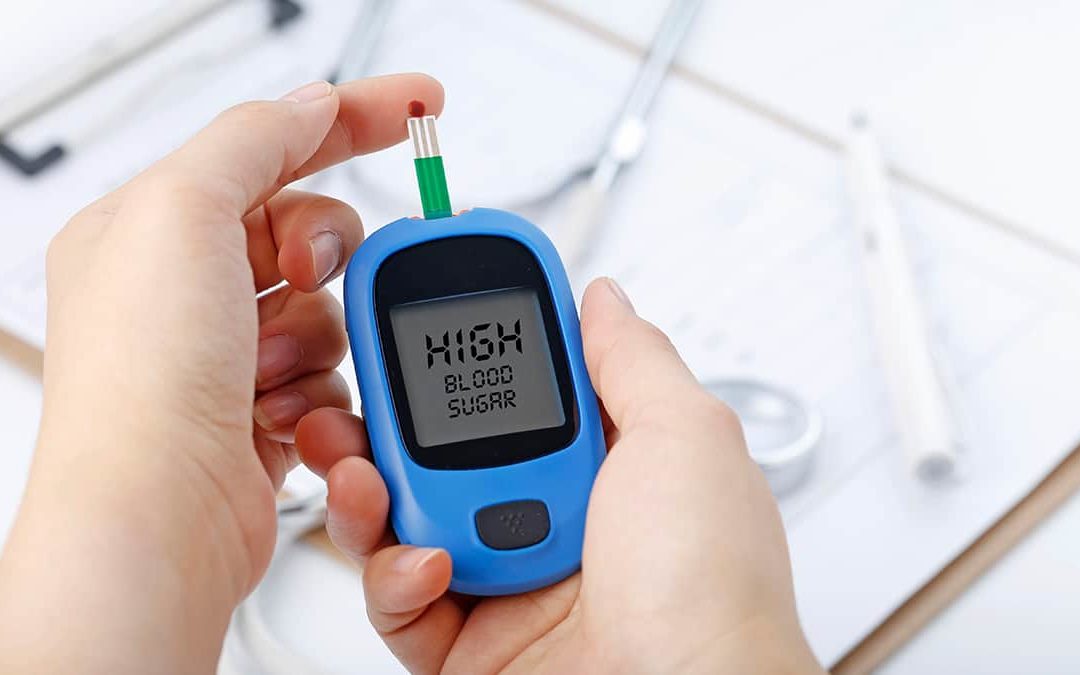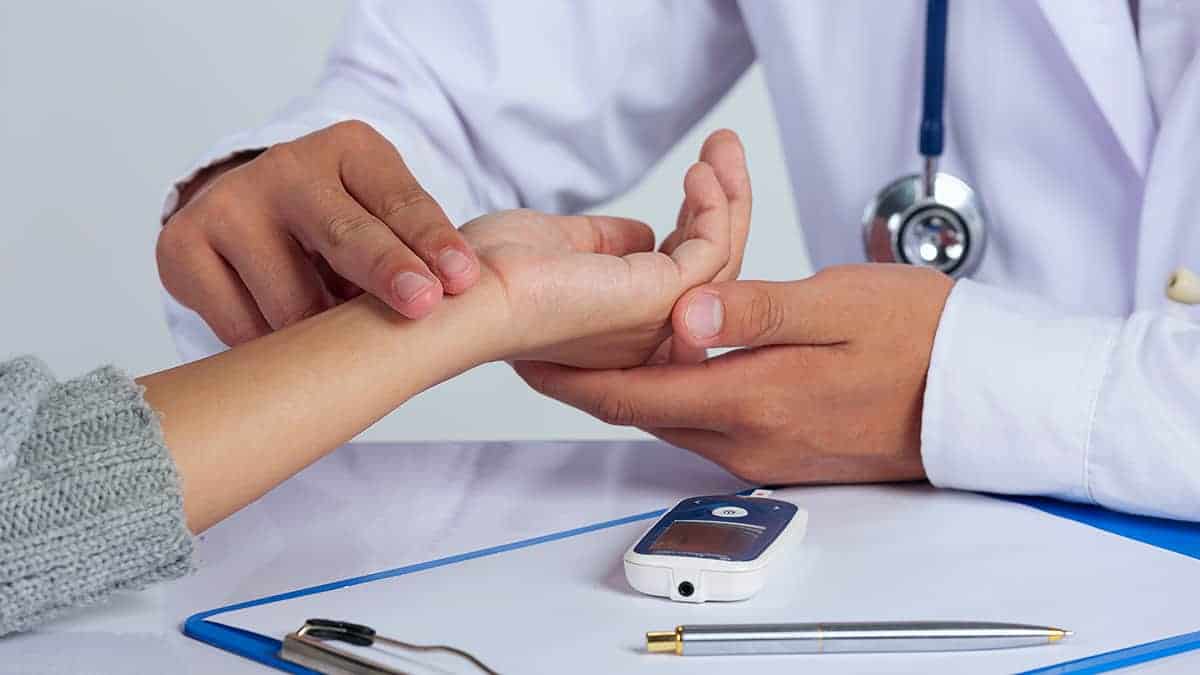So how do you lower your chances of diabetes? There are many ways. The healthier lifestyle changes you can work into your daily life, the lower your risk will be.
- Eat smaller meals: There are many ways to encourage yourself to not overindulge, such as drinking water 10 minutes before your meal so you feel more full, eating smaller portions of meat, sharing a serving of dessert with a family member, or eating more slowly.
- Use a healthy eating plan: Getting more fresh fruits and vegetables and eating whole grains can lower your diabetes risk. Foods to avoid include foods with a lot of fat, such as fried foods.
- Shed a few pounds: You may be able to prevent diabetes by losing only 5-10% of your body weight. This might be more doable than you think. If you weigh 200 pounds, then you would only need to lose 10-20 pounds to meet this goal.
- Get more exercise: Try getting at least half an hour of physical activity five days per week. Going on a walk or jog around your neighborhood may be a simple solution, but other forms of activity help, too. Try dancing as you clean the house, following fitness videos online, or taking the stairs more often.
Programs that combine these elements can have a big impact. For example, the CDC established the National Diabetes Prevention Program to help people make necessary life changes. Participants are coached in eating healthier, working out, and lowering stress levels. Those who lost 5-7% of their body weight and exercised for 150 minutes per week more than halved their chances of developing type 2 diabetes.
Nutrition and Diet for People with Diabetes
Healthy eating is a very important part of managing diabetes. Controlling your diet can lead to better control of blood glucose levels and prevent future diabetes-related health problems.
People with diabetes should try to meet healthy eating goals like:
- Eat several small meals throughout the day rather than a couple of big ones
- Limit the number of carbohydrates
- Eat less sugary foods
- Reduce the amount of salt in the diet
- Eat fewer high-fat foods
- Drink less alcohol
- Incorporate more fruits, veggies, and whole grains into the diet
One of the best ways to meet these goals is to meet with a registered dietician to come up with an eating plan. A professional dietician can help you understand what exactly you need to eat based on factors such as your weight, other health conditions, and the medicines you’re taking.
Some people who have diabetes are interested in adding natural supplements to their diet. Some of these supplements have demonstrated remarkable efficacy in studies. For example, several studies demonstrate that supplements that contain alpha-lipoic acid, chromium, or vitamin C may help people with diabetes control their insulin levels and may assist in maintaining a healthy blood sugar balance.
Supplements, like pharmaceuticals, also may cause side effects. Unfortunately, research has shown that supplements like cinnamon, fenugreek, ginseng, milk thistle, and selenium don’t work for controlling diabetes. If you’re interested in taking supplements, talk to your physician first, as some of them may cause drug interactions with other medications that you are taking. This way you can come up with a game plan that works with your philosophy and also with your body chemistry. Win-win!
Physical Activity
Just as working out can lower your chance of developing diabetes, getting more exercise can also help you keep your blood sugar under control. Try to find some physical activity that gets your heart pumping just a little harder and works all of the muscles throughout your body. Tips to incorporate working out into your routine include:
- Don’t try to do too much all at once. If you start small, and gradually increase your activity level, you’ll be more likely to exercise safely and to stick with it over the long haul.
- Choose an activity you like, so you’re more likely to keep up the new habit. Try something new, like biking or swimming. Alternately, see if there are any fun exercise classes or sports leagues in your area, if and when it is safe to do so.
- Get a workout buddy. You may be more likely to stick with a workout program, and have more fun, if you are going through it with a friend.
- Make a specific action plan. If you want to go on a jog every day, pick specific days and times and mark it on your calendar. You could even try setting an alarm to make sure you don’t forget!
Make sure to check your blood sugar level before and after you work out to make sure it’s within a healthy range. If it’s too low or too high, you could run into serious health problems while exercising. Additionally, people with diabetes have a higher risk of developing foot problems. Wear comfortable shoes and socks and check your feet often for blisters or cuts.
Medication
Some people with diabetes need to take insulin. In particular, taking insulin is important for people with type 1 diabetes, because their bodies no longer make any insulin at all, although some people with type 2 diabetes also need to take this hormone due to insulin resistance the body may develop and the decrease in the secretion of insulin by the pancreas. Insulin may be injected with a needle or a pen, or delivered to the body through a pump, inhaler, or injection port. Different methods of insulin work for different lengths of time and may kick in more quickly or more slowly.
People with type 2 diabetes may also take other medications to help control blood sugar levels. One of the most common is metformin, which helps the body produce less sugar. Many other types of medications also affect blood sugar in different ways, such as stimulating the body to produce more insulin or helping the body use insulin more efficiently. Some people find that a combination of multiple different medications helps lower their blood glucose levels more than any one pill alone.
Managing Mental Health
Taking care of your mental health is important, because high stress levels can lead to high blood glucose levels. Stress reduction techniques may include:
- Deep breathing exercises
- Meditation
- Yoga
- Listening to music
- Taking a walk
- Gardening
- Participating in a hobby
Managing a long-term illness can be tough, and many people with a condition like diabetes end up struggling with depression. Having a support network may help you manage. Try talking to friends or family members when you’re going through a rough patch. Additionally, in-person or online support groups exist to help people deal with diabetes. Many people also find it useful to go to a counselor, therapist, or other mental health professional.
Coming Up with a Care Plan That Works For You
There are a lot of things that people with diabetes can do to help manage their condition. Work with your healthcare team to come up with a strategy that works with your lifestyle, your age, your weight, and your other health needs. You may end up working with an endocrinologist (a doctor who specializes in treating hormone-related conditions like diabetes), dietician, certified diabetes educator, eye doctor, podiatrist (a doctor that treats foot conditions), social worker, counselor, or other healthcare professionals.
Conclusion
There are many factors that may increase a person’s risk for diabetes. Some of these, such as age or genetics, are completely outside of our control. However, other factors are more easily changed. But just because one person’s genetics may predispose them to diabetes, there is still no guarantee that one is destined to develop diabetes. Focusing on the things you can control, such as how much physical activity you get throughout the day, can allow you to take your health into your own hands and help delay or prevent diabetes.























